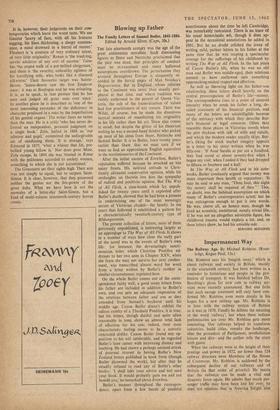Blowing up Father
The Family Letters of Samuel Butler, 1841-1886. Edited by Arnold Silver. (Cape, 30s.) THE late nineteenth century was the age of the great antinomian moralists. Such dominating figures as Ibsen and Nietzsche proclaimed that the past was dead, that principles of conduct must be re-examined and many hallowed assumptions overthrown. The perturbation they aroused throughout Europe is eloquently re- corded in the fervid pages of Max Nordau's Degeneration. But in England, whose relation to the Continent was more than usually peri- pheral at that time, and where tradition was visibly enthroned in the person of Queen Vic- toria, the cult of the transvaluation of values had few practitioners of any stature. There was Wilde, of course; but he made the disastrous tactical mistake of manifesting his originality in his life rather than his art. Shaw also comes to mind; but despite the glitter of his theatrical writing he was a second-hand thinker who picked up most of his ideas from Ibsen, Nietzsche and Samuel Butler. It is to Butler, born twenty years earlier than Shaw, that we must turn if we want to find an approximate English equivalent to the revolutionaries of the Continent.
After the initial success of Erewhon, Butler's reputation suffered because he attacked on too many fronts. His satirical attitude to Chris- tianity alienated conservative opinion, while his onslaughts on Darwin lost him the sympathy of radical and positivist opinion. But The Way of All Flesh, a time-bomb which lay unpub- lished for twenty years until it exploded after Butler's death, showed that he had been a pioneer in undermining one of the most seemingly secure of Victorian citadels—the family. In the years that followed it established a pattern for a characteristically twentieth-century type of Bildungsroman.
The present collection of letters, most of them previously unpublished, is interesting largely as an appendage to The Way of All Flesh. It shows in a number of ways how close the early part of the novel was to the events of Butler's own life: for instance, the devastatingly sancti- monious letter which Christina Pontifex ad- dresses to her two sons in Chapter XXV, when she fears she may not survive her next confine- ment, was transcribed almost word for word from a letter written by Butler's mother in similar circumstances, reprinted here.
On the whole Butler comes out of the corre- spondence fairly well; a good many letters from his father are included in addition to Butler's own, and one gets an adequate impression of the relations between father and son as they extended from Samuel's boyhood until his middle age. Canon Butler doesn't exhibit the odious cruelty of a Theobald Pontifex, it is true; but his letters, though dutiful and quite often reasonable in tone, show an almost total lack of affection for his son; indeed, their most characteristic feeling seems to be a scarcely concealed dislike. Canon Butler found any op- position to his will intolerable, and he regarded Butler's later career with increasing dismay and loathing. He had shown a perhaps unusual streak of paternal interest in having Butler's New Zealand letters published in book form (though Butler disowned the work), but after that he steadily refused to read any of Butler's other books: 'I shall take your advice and not read your book. It would probably pain me and not benefit you,' he remarked about Erewhon.
Butler's manner throughout the correspon- dence, apart from a few bursts of youthful
assertiveness about the time he left Cambridge, was remarkably restrained. There is no trace of his usual iconoclastic wit, though it does ap- pear in the occasional annotations he added in 1901. But he no doubt relished the irony of writing mild, patient letters to his father at the same time that he was reaping a spectacular revenge for the sufferings of his childhood by writing The Way of All Flesh. In the last years of Canon Butler's life, when he was an old man and Butler was middle-aged, their relations seemed to have mellowed into something approaching mutual respect and affection.
As well as throwing light on the father-son relationship, these letters dwell heavily on the central preoccupation of Butler's life—money. The correspondence rises to a point of unusual intensity when he sends his father a long, de- tailed statement of his financial position, and many of the letters are unintelligible because of the intricacy with which they describe But- ler's financial or legal concerns. Often they resemble those places in Victorian novels when the plot thickens with talk of wills and entails, and which the modern reader usually skips. But- ler's liking for stock market imagery appears in a letter to his sister written when he was fifty-one: 'If Aunt Sarahs at par are a hundred, they had stood at about seventy-five when I began my visit; when I ended it they had dropped to fifteen or fourteen and a half.'
In The Way of All Flesh and in his note- books, Butler constantly argued that money was more important than health or reputation: 'It may be said to any man, "Thou fool, this night thy money shall be required of thee."' This, no doubt, was the habitual assumption on which many of Butler's contemporaries acted; but he was outrageous enough to put it into words. He was, above all, an honest man, though he lived an eccentric, embittered, mostly trivial life., If he was not an altogether admirable figure, his childhood trauma would explain a lot, and, as these letters show, he had his amiable side.
BERNARD BERGONZI.


































 Previous page
Previous page